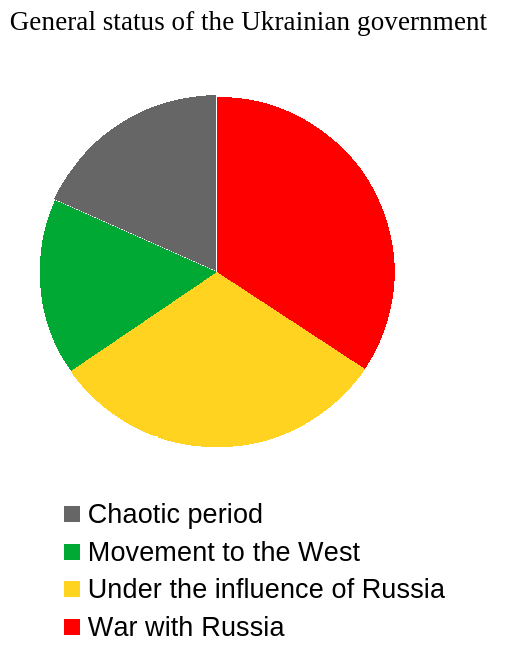Russians like to ask Ukrainians what achievements our country has made. Ok,🇺🇦is poor, but I can list many of its achievements.
But let's put it aside for now and look at it from a different angle. How has🇷🇺influenced Ukraine? Look at the chart.
Let me explain what it means.👇
But let's put it aside for now and look at it from a different angle. How has🇷🇺influenced Ukraine? Look at the chart.
Let me explain what it means.👇

1992-1994 were marked by the collapse of USSR. The political system was being restructured, laws were changing, transition to market economy was beginning. People had no time for geopolitics—everyone was trying to survive.
That is why I refer to this period as "chaotic."👇
That is why I refer to this period as "chaotic."👇
In 1994, Kuchma became president, and Ukrainians generally decided on the geopolitical orientation: the majority leaned toward neutrality, to be a bridge between East and West. Kuchma's policy was consistent with this.
But West wasn't interested in🇺🇦.🇷🇺,on the other hand, was.👇
But West wasn't interested in🇺🇦.🇷🇺,on the other hand, was.👇
As a result, Russia had a greater influence on Ukraine's development during that period than the West. Russian political scientists worked for Ukrainian politicians. Ukrainian oligarchs emerged, who made money on shady trade schemes with Russia. 👇
Russians by origin (and not only by origin) headed Ukraine's political parties and held high positions in the government. This caused dissatisfaction among many citizens.👇
But Kuchma was a cunning and experienced politician; he managed to get re-elected for a second term and continued the oligarchic cooperation with Russia.
That is why I refer to Kuchma's two terms as a period "Under the influence of Russia".👇
That is why I refer to Kuchma's two terms as a period "Under the influence of Russia".👇
Kuchma's attempts to appoint Yanukovych as his successor (as Yeltsin did with Putin) and Yanukovych's attempts to rig the election led to Maidan protests in 2004. Сitizens demanded a reorientation of politics toward the West and won. 👇
A pro-European majority formed in Parliament and a pro-European government was formed. I refer to this brief period as the movement toward the West.
But Russia could not allow this to happen and did everything possible to prevent it. 👇
But Russia could not allow this to happen and did everything possible to prevent it. 👇
Let us recall, for example, "gas conflict of 2005–2006." Acting from within and without,🇷🇺was able to slow down🇺🇦European course, and the country fell into a long political crisis in 2007. This is another period of chaos. 👇
The chaos ended in 2010 with the victory of pro-Russian Yanukovych in the presidential elections. Although, in order to win, he had to somewhat retreat from his pro-Russian stance and promise to maintain the country's European course. But Yanukovych did not keep his promise.👇
He continued Kuchma's oligarchic policies and turned eastward. This led to the Maidan protests of 2013.
Maidan prevailed in a difficult struggle. However, the Russian army invaded Ukraine in 2014, and a period of war began. Ukraine's GDP fell by 10% for two consecutive years.👇
Maidan prevailed in a difficult struggle. However, the Russian army invaded Ukraine in 2014, and a period of war began. Ukraine's GDP fell by 10% for two consecutive years.👇
Following the full-scale invasion of 2022, GDP fell by 30%. Take another look at the pie chart above. For most of its history, Ukraine has either been under Russian influence or at war with Russia.
For many years, Ukrainians had to devote all their energy to fighting Russia.👇
For many years, Ukrainians had to devote all their energy to fighting Russia.👇
And then the Russians have the audacity to ask us: "Why haven't you built paradise for yourselves?"
And you, gentlemen in the West, look at what it means to be Russia's neighbor. Do you really want to go through what we are going through?
And you, gentlemen in the West, look at what it means to be Russia's neighbor. Do you really want to go through what we are going through?
@threadreaderapp Unroll
• • •
Missing some Tweet in this thread? You can try to
force a refresh





